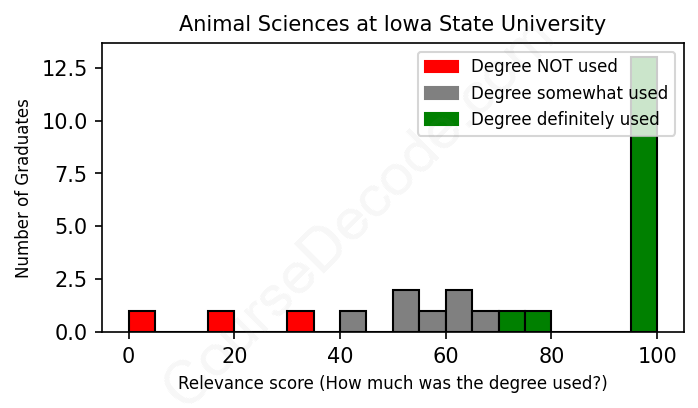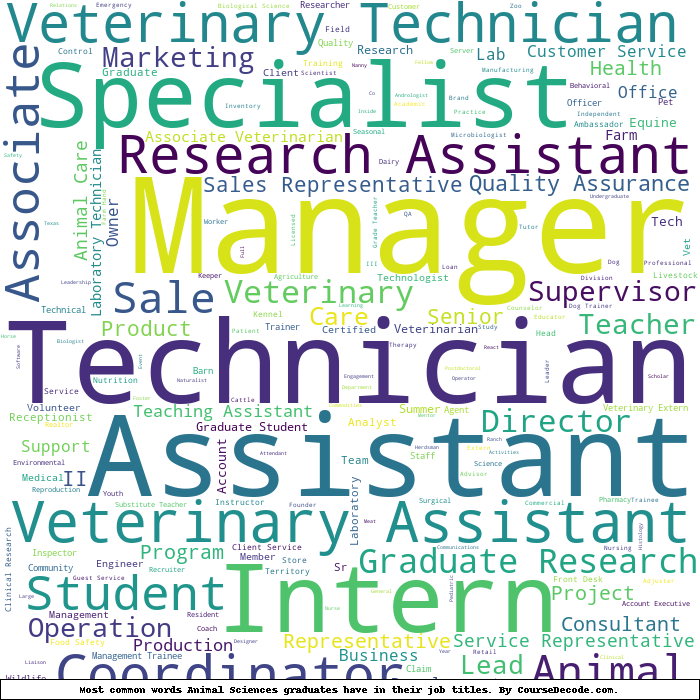
First, some facts. Of the Animal Sciences graduates from Iowa State University we've analyzed , here's how many have used (or NOT used) their degree in their career:

These are estimates based on AI analysis of 25 LinkedIn profiles (see below).
The verdict? Above average. Overall, with an average relevance score of 75%, Animal Sciences graduates from Iowa State University have a higher likelihood (+8%) of finding work in this field compared to the average graduate across all fields:
And for comparison, here's the chart for all profiles we've looked at across all degrees.
Also, after graduating, 36% of these graduates have pursued further education other than another Bachelor's degree (such as a Masters degree or other), compared to the average across all profiles of 35%. This suggests you may need more than just a Bachelors degree to be competitive as a Animal Sciences graduate.
See the details:
|
Relevance score: 100% We think this person has gone into a career highly relevant to their degree. We think this person has gone into a career highly relevant to their degree.
DEGREE INFOGraduated in 2010 from Iowa State University with a Bachelor's degree in Animal Sciences. Also pursued further education since (see below). JOB HISTORY SINCE GRADUATIONGraduate Research Assistant Texas Tech University Aug 2010 - Jan 2013 Graduate Research Assistant  Kansas State University Aug 2012 - Present Research Associate  Puretein Biosciences Jan 2017 - Present FURTHER DEGREES DONE SINCE GRADUATINGMaster's degreeTexas Tech University 2010 - 2012 Doctor of Philosophy - PhD Kansas State University 2012 - 2016 ABOUTNo information provided. |
The top 10 most common jobs done by the graduates we've analyzed (ranked most common to least) are:
When diving into the career paths of graduates from Iowa State University with degrees in Animal Sciences, it’s clear that many end up in roles closely tied to their studies. A large chunk of these professionals works in research-related positions, such as Graduate Research Assistants or Research Associates, which directly utilize the scientific knowledge and methodologies they learned during their academic journey. Additionally, there are numerous individuals who take on more hands-on roles like Veterinary Assistants, Animal Care Technicians, or positions in animal management within farms, which also heavily rely on the core competencies that come from their Animal Sciences program.
However, not every graduate stays in the realm of animal-related fields. Some have ventured into roles that are quite a leap from their studies, like recruiters or various management positions that don't tap into their Animal Sciences expertise. Positions in areas such as marketing, IT, or quality assurance also appear, indicating that while their degree has given them a solid foundation, some graduates branch out into careers where their direct training may not be as useful. Overall, while many alumni are clearly finding relevant and meaningful work that connects back to their Animal Sciences education, there’s also a significant number who find themselves in unrelated fields, showcasing a mix of paths after graduation.
Here is a visual representation of the most common words in job titles for Animal Sciences graduates (this is across all Animal Sciences graduates we've analyzed, not just those who went to Iowa State University):

Looking at the career paths of graduates from Iowa State University with a degree in Animal Sciences, it's clear that many of them start off in roles that are closely aligned with their field. Many graduates secure positions as animal technicians, research assistants, and even veterinarians right after finishing their studies. For example, those who graduated in 2010 found roles like technician in veterinary labs and graduate research assistants—solid first jobs for anyone looking to build a future in animal sciences. The early years tend to focus on gaining practical experience and skills, particularly in veterinary support, production, or compliance roles related to livestock.
As for where these graduates end up a handful of years later, the trend appears to develop well for many. Several go on to hold more senior positions, such as site managers or specialists, and some even transition into roles that may not be directly related to animal sciences but still take advantage of their scientific training, like recruiters and business analysts. However, it's also apparent that certain individuals diverge significantly, with a few landing jobs in unrelated fields like software analysis or security. Overall, many seem to stay relatively close to their studies, with a solid number progressing into roles like veterinarians, animal care specialists, and research associates. If you're passionate about animals, this degree seems to hold some weight in carving out a fulfilling career.
Getting a Bachelor’s degree in Animal Sciences at Iowa State University is pretty challenging but definitely manageable if you're passionate about the subject. The coursework can be rigorous, covering everything from animal biology and genetics to nutrition and management practices, which means you'll need to grasp some solid science concepts along the way. It’s not the hardest degree out there, but you’ll definitely have to put in the effort, especially if you want to do well in labs or hands-on projects. If you love learning about animals and are willing to stay organized and study regularly, you can totally rock it!
Most commonly, in the LinkedIn profiles we've looked at, it takes people 4 years to finish a Bachelor degree in Animal Sciences.
Looking at the career paths of these Animal Sciences grads from Iowa State University, it seems like there’s a pretty mixed bag when it comes to money. Many of them started in entry-level roles like technicians or assistants, which typically don’t bring in a huge paycheck right off the bat. However, over time, some of them moved into positions with more responsibility, like research associates or senior roles at established companies, suggesting that they’re likely earning a better salary now. For instance, those who climbed the ladder to roles in management or specialized fields, like veterinary medicine, probably make decent money. Overall, while some may still be working their way up the financial ladder, others appear to have landed solid positions that could set them up for a good salary in the future. It’s all about that gradual climb, you know?
Here is a visual representation of the most common words seen in the "about" section of LinkedIn profiles who have a Bachelor degree in Animal Sciences (this is across all Animal Sciences graduates we've analyzed, not just those who went to Iowa State University). This may or may not be useful:

Here are all colleges offering a Bachelor degree in Animal Sciences (ordered by the average relevance score of their Animal Sciences graduates, best to worst) where we have analyzed at least 10 of their graduates:
| College | Score | Count |
|---|---|---|
 Purdue University Purdue University
|
80 | 14 |
 California State Polytechnic University-Pomona California State Polytechnic University-Pomona
|
78 | 13 |
 North Carolina State University North Carolina State University
|
77 | 18 |
 Iowa State University Iowa State University
|
75 | 25 |
 University of Missouri-Columbia University of Missouri-Columbia
|
75 | 12 |
 South Dakota State University South Dakota State University
|
73 | 10 |
 The Ohio State University The Ohio State University
|
71 | 21 |
 University of Florida University of Florida
|
68 | 15 |
 University of Vermont University of Vermont
|
68 | 12 |
 Michigan State University Michigan State University
|
67 | 20 |
 University of California, Davis University of California, Davis
|
66 | 27 |
 University of Illinois at Urbana-Champaign University of Illinois at Urbana-Champaign
|
63 | 16 |
 University of Tennessee, Knoxville University of Tennessee, Knoxville
|
61 | 13 |
 University of Arkansas University of Arkansas
|
60 | 10 |
 California Polytechnic State University-San Luis Obispo California Polytechnic State University-San Luis Obispo
|
59 | 22 |
 University of Wisconsin-River Falls University of Wisconsin-River Falls
|
58 | 10 |
 Texas A&M University Texas A&M University
|
54 | 34 |
 Penn State University Penn State University
|
53 | 14 |
 Texas Tech University Texas Tech University
|
51 | 12 |
 Kansas State University Kansas State University
|
51 | 22 |
 Oklahoma State University Oklahoma State University
|
43 | 16 |